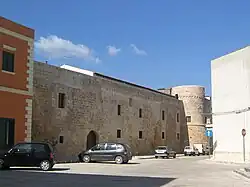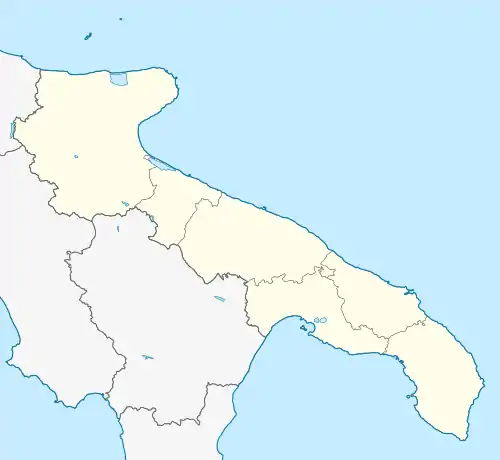Acquarica del Capo | |
|---|---|
| Comune di Acquarica del Capo | |
 Medieval castle | |
 Coat of arms | |
Location of Acquarica del Capo | |
 Acquarica del Capo Location of Acquarica del Capo in Italy  Acquarica del Capo Acquarica del Capo (Apulia) | |
| Coordinates: E39°54′46″N 18°14′46″E / 39.91278°N 18.24611°E | |
| Country | Italy |
| Region | |
| Province | Lecce (LE) |
| Government | |
| • Mayor | Francesco Ferraro |
| Area | |
| • Total | 18.7 km2 (7.2 sq mi) |
| Elevation | 110 m (360 ft) |
| Population (30 April 2017)[2] | |
| • Total | 4,710 |
| • Density | 250/km2 (650/sq mi) |
| Demonym | Acquaricesi |
| Time zone | UTC+1 (CET) |
| • Summer (DST) | UTC+2 (CEST) |
| Postal code | 73040 |
| Dialing code | 0833 |
| Patron saint | St. Charles Borromeo |
| Saint day | November 4 |
| Website | Official website |

Church of Madonna dei Panetti.
Acquarica del Capo was a town and comune in the province of Lecce, Apulia, south-eastern Italy. In 2019 it was merged with the adjacent Presicce to form Presicce-Acquarica.
It is located in Salento, 10 km from the Ionian Sea and 60 km from Lecce. Its origins are medieval and it grew around a Norman fortification. Later it was transformed into a castle town by the Aragonese.
Main sights
- Medieval castle. It was probably a Norman fortification around which the village developed in the Middle Ages and was later transformed in a Castle in the 14th century by Giovanni Antonio Orsini Del Balzo, Prince of Taranto. Only a round tower remains from the original four. In the court can be seen the so-called "Pila di Pompignano" saved from destruction in 1982 by the local writer Carlo Stasi who wrote its legend.[3]
- Church of San Carlo Borromeo
- Church of San Giovanni Battista
- Church Madonna dei Panetti, at Celsorizzo, one of the most ancient constructions in the lower Salento.
- Fortified masseria of Celsorizzo. A huge Norman Tower with Byzantine frescoes in the Chapel at its base.
- Church of Madonna di Pompignano
References
- ↑ "Superficie di Comuni Province e Regioni italiane al 9 ottobre 2011". Italian National Institute of Statistics. Retrieved 16 March 2019.
- ↑ Population from ISTAT
- ↑ "La Pila di Pompignano", pp. 129-164, in Carlo Stasi, Leucàsia e Le Due Sorelle (Storie e leggende del Salento), Mancarella Ed., Cavallino, 2008, 2012, ISBN 9788890366901
This article is issued from Wikipedia. The text is licensed under Creative Commons - Attribution - Sharealike. Additional terms may apply for the media files.
